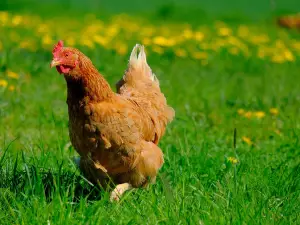
Chickens aren’t always the smartest of birds. They are curious and may sometimes eat items that should not be eaten.
If you don’t keep a clean yard, and you leave things like cigarettes, candy, nails, screws and pieces of plastic lying around, your bird will find it and may try to eat it.
Even if your bird is a bit smarter and doesn’t go around eating small inedible objects, it may try to eat some plants that may not be good for them. If you have English ivy in your garden, this may be something you worry about. So, can chickens eat English ivy?
Chickens cannot eat English ivy, this plant is poisonous to birds and other animals when ingested. If they do try to eat it, the ivy’s bitter taste and toughness will usually put the bird off before the bird eats enough to poison itself
Table of Contents
Can chickens eat English ivy?
English ivies are climbing plants that look pretty good in gardens. These plants can grow up to 50 feet long (or 15 meters long) if left undisturbed.
They are quite attractive, which makes them useful as they can cover up any unsightly views. As useful as this plant is, it cannot be fed to chickens
Chickens do well on a diet of fruits, vegetables, and grains. English ivy does not fall into any of these categories; in fact, English ivy is poisonous to chickens.
Many poisonous plants use poison as a defence mechanism; the poison keeps herbivores away, which is a means of survival for the plants.
Chickens will leave English ivy alone:
When chickens are left to freely forage, they usually ignore English ivy. Chickens have a knack for assessing which plants are edible and which are not.
Animals such as goats, sheep, and other livestock may eat this plant, but chickens rarely ever do.
English ivy is toxic to chickens, and they tend to avoid it. That being said, some chickens will still try to eat this plant, but they won’t get very far, this plant tastes very bad to them.
Thus, even if the bird does try to chomp down on this plant, the bird will be put off by the taste and won’t eat enough to be poisoned by it.
Chickens may also pick at the plant, not out of hunger, but out of boredom. If they have nothing else to peck at, they may try their luck with the English ivy.
Still, they will be put off by the bad taste of the plant and move on to doing something else.
In addition, because the leaves of this plant are quite tough, picking at the plant can quickly become a hassle.
Signs that your chicken has eaten english ivy:
If the bird does eat enough of the plant, it can cause problems in its intestinal tract, dermatitis, shortness of breath, reddening of the skin, and itching.
Note: If your chickens are drawn to English ivy and don’t seem to understand that this plant is not good for them, then you may need to remove the plant from your garden if you don’t want your chickens to poison themselves.
Do chickens eat English ivy berries?
The berries that are produced by English ivy plants are poisonous to mammals but not to birds, including chickens.
Other birds can eat, and usually enjoy, these berries; in fact, the berries are loved by birds so much that this plant is popular among bird lovers looking to attract birds to their garden.
How to protect your English ivy from chickens
If you need to keep your curious chickens away from your English ivy plants, there are a couple of safeguards you can use, these include fencing the area off, using inflatable rattlesnakes, and using bird netting.
Bird netting is especially easy to set up and very effective in protecting your plants. This netting will keep all types of birds away. Fencing can be added or removed whenever needed, it does not have to be permanent
FAQ:
What plants do chickens eat the most?
Chickens will eat whatever plant is around them and grows the most, the plant that grows the most is the calendula.
This plant is pretty resilient and grows like a weed all over the place; for this reason, your chickens will eat this plant the most.
Your birds will eat the fresh and dried petals of this plant, and the plant will simply grow again.
What animal eats English ivy?
While the English ivy is poisonous, this plant is actually eaten by a variety of animals.
The animals that eat this plant include deer, rabbits, squirrels, voles, mice, birds, groundhogs, woodchucks, and even lambs.
Conclusion
In conclusion, no, chickens don’t eat English ivy. Chickens can usually tell which food is good for them and which food is not and they will usually avoid English ivy entirely.
The plant’s bitter taste and toughness will repel birds that try to peck at the plant
If you enjoyed this article then you may also be interested in other chicken related articles. Here are some articles that you may be interested in: Can chickens eat turnips?, Can chickens eat timothy hay?, Can chickens eat yellow cucumbers?, Can chickens eat yellow rice?

